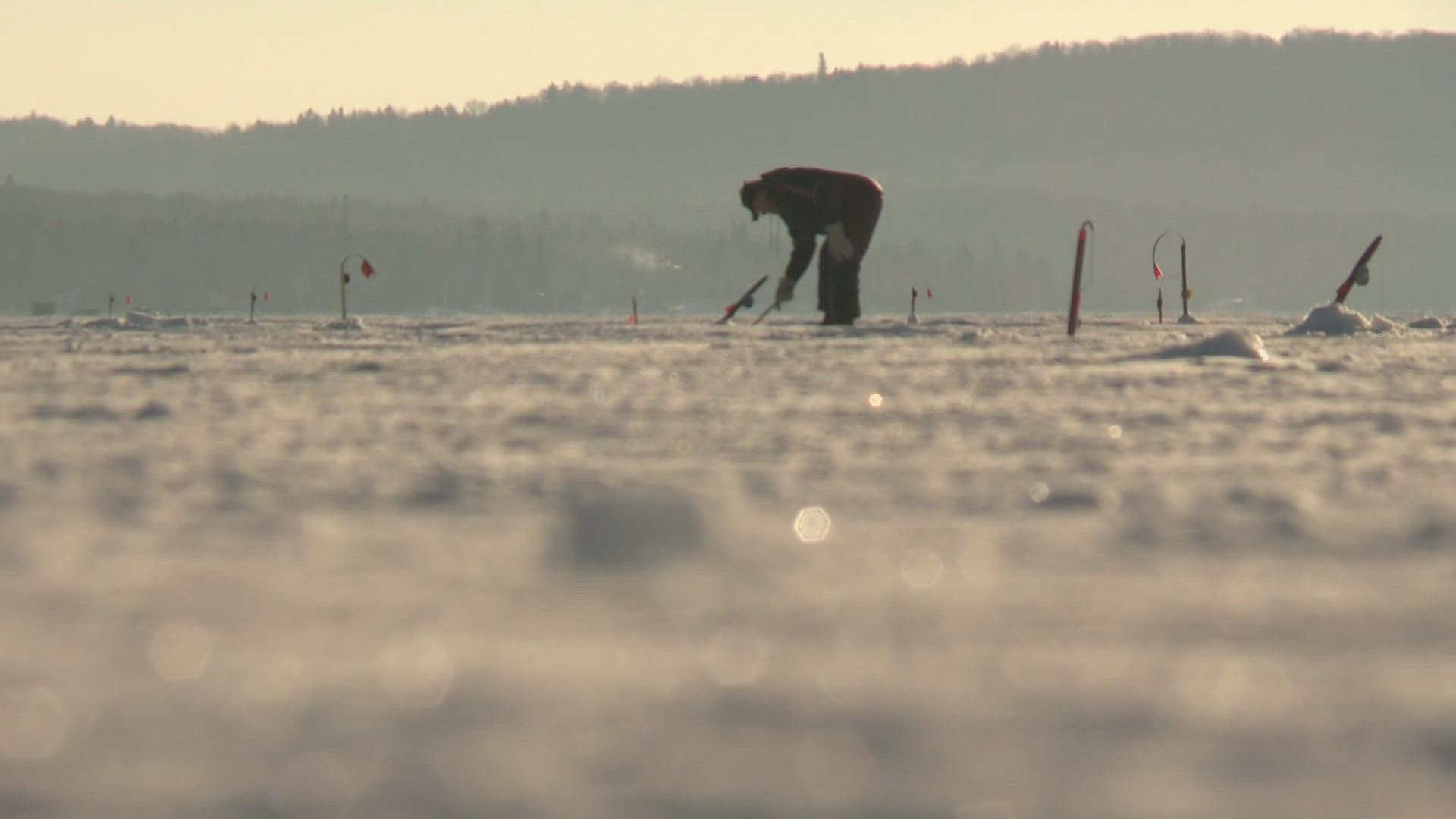MAINE, USA — Winter in Maine: dark, cold, and seemingly unending. Ask almost anyone, and they'll tell you that you have to have a hobby in order to keep your spirits high.
Some of these hobbyists live for Maine winters, though. Ski resorts are packed, snowmobile trails rival Interstate 95 in July, and lakes are dotted with ice fishing shacks from Kittery to Calais.
That is ... if the winter season allows. Christi Holmes, an avid angler and general outdoors enthusiast walked me through her seasonal preps.
“I usually don’t start prepping until after I get a deer. But once I get a deer, I really start thinking about ice fishing season,” Holmes explained.
A lot of Mainers fall into this category. You have to enjoy the seasons while they're here, but there's always some consideration about what's next.
“We’re serious ice fishers, too. We don’t just go out drinking ... we’re fishing,” Holmes said.
One of her biggest hobbies is fishing. It's not a surprise, of course. Outdoor recreation like this is important to most Mainers, and that goes for any season of the year.
“We have to make sure everything’s working all right. You know, we like to doctor up our traps, add a little reflective sticker in case it’s dark when we set up so the snowmobiles can see them,” Holmes said.
In other words, you can't just toss some traps on the ice and call it good. Some effort goes into planning for these outdoor hobbies.
In fact, Holmes is used to spending time on the water year-round.
When you spend this much time outside, you tend to notice when things are changing. These can include small changes, like an area that was washed out after a storm. They can sometimes include bigger changes, like the shorter ice duration and earlier ice outs across Maine.
“We used to fish in December on Sabattus Pond, for example, because they allow live bait in December. And last year we couldn’t because the ice wasn’t thick enough,” Holmes said.
Instead of just waiting for a date on the calendar, you need to double- and triple-check that the ice is safe. This is especially true at the beginning of the season, but it also applies to any warm stretches in the winter months.
“I’ll drive by a pond a couple days before I plan on fishing it to check out if anyone is on the ice, if they have snowmobiles, if they have shacks out, things like that,” Holmes said.
These are experiences shared amongst anglers and other ice sport enthusiasts.
At first glance, this sounds like a lot of anecdotal data. However, numbers support these claims.
Lloyd Irland has been cataloging ice-out and ice duration data in Maine for decades.
“A long time ago, I stumbled upon information on ice-out dates, and I had been interested in impacts of extreme events on forests for some time. And then I fell into some work on climate change and ice storms,” Irland explained.
Irland is a semi-retired consultant who works with Maine's state government. He used to be the director of public lands for Maine.
Don’t let the forestry title fool you, though. Irland has a passion for logging, analyzing ice data, and has published academic papers on climate change.
Irland's ice-out data includes lakes in Maine, as well as other New England and upper Midwest states.
“There was no one else who had written about it or had known much about it, so I wrote about it," Irland said.
This data stretches back centuries, in some cases. In fact, there are New England ice-out records that stretch much further back than temperature records.
A great example of the long-duration data set is the one for Sebago Lake. Ice-out records date back to 1807, with a few missing years here and there. Overall, though, that's a long enough timeline to pick out many trends.
“The other thing that intrigues about ice-out dates is that it’s a variable that integrates a lot of influences. It’s not just temperature ... which is just temperature. That’s all it is. It integrates the regime of temperature, it integrates rainfall, it integrates snow, it integrates wind," Irland said.
Ice-out data and ice duration data are valuable in picking out long-term trends in Maine’s climate. The trend here is clear. Ice duration has declined significantly since the late 19th or early 20th centuries.
“That’s huge. It’s like 20 days earlier on a lot of our lakes in Maine than it was earlier,” Irland said.
Since the 1980s, ice-in and ice-out dates are now much more sporadic and difficult to predict as the weather patterns become more extreme. That, of course, has an impact on everything from recreation to people’s livelihoods.
It's not just Maine's lakes. Rivers are suffering from many of the same issues. Take smelt fishing, for example.
Holmes told me all about the issues that smelt fishers have, as well as various fishing derbies that were postponed or canceled.
“Last year, the season was pretty short, and it’s such a great Maine tradition to go out there at night, and catch smelts, and fry them up. It’s really special and would be disappointing if the season keeps getting shorter every year,” Holmes explained.
The shorter ice seasons are already being felt by Mainers. Smelt fishing on the Kennebec and ice fishing derbies are a way of life.
Unfortunately, climate change is already affecting these traditions and will likely be a defining factor in Maine’s winters for the coming years.
More NEWS CENTER Maine stories.

